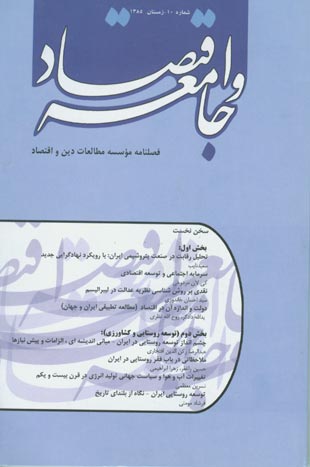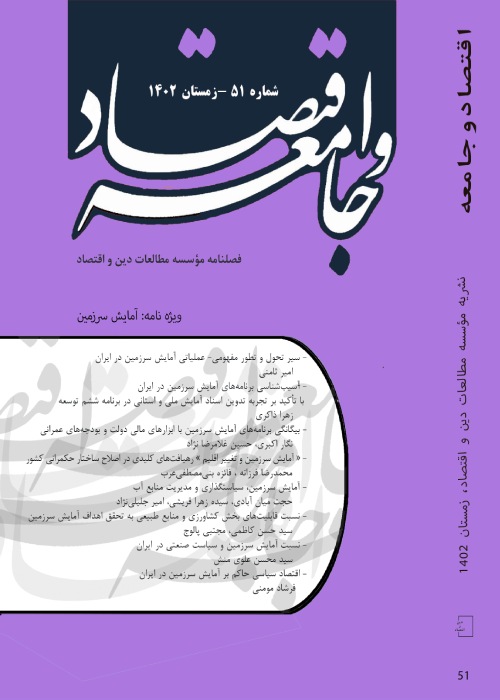فهرست مطالب

نشریه اقتصاد و جامعه
پیاپی 10 (زمستان 1385)
- 200 صفحه، بهای روی جلد: 2,000ريال
- تاریخ انتشار: 1386/06/05
- تعداد عناوین: 9
-
صفحه 4
- بخش اول
-
صفحه 8سرمایه گذاری های اخیر در صنعت پتروشیمی موجب افزایش اهمیت این صنعت در اقتصاد ملی گردیده است. از سوی دیگر رویکرد صادراتی واحدهای این صنعت رقابتی در سطح جهانی را به همراه داشته است. این مقاله در پی آن است تا با نشان دادن ابعاد این رقابت و نیز وضعیت صنعت پتروشیمی در این حوزه ذهن سیاست گذاران را از توجه به متغیرهای رقابت سلبی همچون رویه های بازرگانی غیر منصفانه با تبانی به سمت متغیرهای رقابت ایجابی همچون نهادهای ارتقا دهنده فناوری، کاهش دهنده اطلاعات نامتقارن و درونی کننده آثار خارجی معطوف نماید. این موضوعی...
-
صفحه 40سرمایه اجتماعی مجموعه نظام مند ارزش های غیر رسمی، هنجارها، قواعد و تعهدات است که در جامعه استقرار یافته، موجب تسهیل و کارآمدی مناسبات میان اعضای آن جامعه شده و ظرفیت هایی برای دستیابی به اهداف خاص ایجاد می کند. سرمایه اجتماعی قادر است در زمینه های خاص ناکارآمدی دولت و بازار ایفای نقش کند و جبران کننده آن کاستی ها باشد. در کنار دو نهاد دولت و بازار سرمایه اجتماعی می تواند تنظیم کننده مناسبات بشر در حوزه اقتصاد و تسهیل کننده فرایند توسعه باشد. بررسی متغیرهای سرمایه اجتماعی و همچنین توسعه 33 کشور نمونه...
-
صفحه 68هدف این مقاله نقد یکی از ابعاد روش شناختی نظریه عدالت اجتماعی و اقتصادی در نگرش لیبرال است و از معرفی دو رهیافت لیبرال در نظریه عدالت آغاز می کند. در این میان به جهت قوت و اهمیت بیشتر رهیافت وظیفه گرا در مقابل رهیافت مطلوبیت گرا به تبیین مبنا و ادعای روشن شناختی رهیافت نخست می پردازد عدم اتکا نظریه عدالت بر ارزش های اجتماعی خاص و آزادی پیگیری انواع اهداف شخصی در سایه این نظریه عدالت. در بخش پایانی به نقد این مدعا و ضعف روش شناختی نظریه عدالت لیبرال و نتایج آن خواهیم پرداخت و نشان می دهیم که این نظریه نیز پیش فرض های...
کلیدواژگان: نظریه عدالت، لیبرالیسم، روش شناسی، مطلوبیت گرایی، فلسفه اقتصاد -
صفحه 86نقش صحیح و اندازه متناسب دولت، به عنوان بحثی جدال برانگیز بین اقتصاد دانان و دولتمردان حداقل از دوره کلاسیک ها در قرن نوزدهم شروع شده و هنوز هم ادامه دارد. البته تفکرات و سیاست های اقتصادی دولت ها در حال حاضر به طور قابل ملاحظه ای تغییر کرده اند. از هنگام جنگ جهانی اول که حضور دولت ها در اقتصاد بیشتر شد از زمانی که سیستم های تامین اجتماعی شروع به گسترش کرد و از زمانی که سیاست ها و برنامه های دولتی پس از بحران کبیر و جنگ جهانی دوم اعلام شد، هزینه های بخش عمومی به طور جدی شروع به افزایش کرد. در حقیقت دوره پس از جنگ جهانی...
کلیدواژگان: اندازه دولت، اقتصاد ایران، اندازه دولت ایران، دولت در کشورهای منتخب - بخش دوم (توسعه روستایی و کشاورزی)
-
صفحه 120امروزه آشکار کردن و باز کردن ظرفیت ها و توانمندی های بالقوه جامعه روستایی یکی از اهداف بنیادین توسعه روستایی به شمار می رود. این ظرفیت ها و توانمندی ها از طریق تصمیم گیری هدفمند آرمانی در چارچوب برنامه ریزی راهبردی که یک کارآفرینی و تولید جمعی و مشترک است به فعلیت می رسند و حق توسعه یافتگی و زندگی شرافتمندانه را در این فضاهای زیست فعالیت نهادینه می کنند. نهادینه کردن چنین اهدافی با رویکرد نرم افزاری به توسعه روستایی مشارکت فراگیر مردم و سازماندهی شده خوشه ایو شبکه ای کردن آن امکان پذیر است. در چنین...
کلیدواژگان: ظرفیت ها، توانمندی، توسعه روستایی، چشم انداز، برنامه ریزی راهبردی -
صفحه 154تفاوت های اقلیمی و تاریخی در ایران موجب بروز تفاوت های چشمگیری در میزان توسعه یافتگی اقتصادی اجتماعی مناطق مختلف کشور شده است. مع الاسف به دلیل کیفیت آمار گردآوری شده در ایران محاسبات انجام شده قادر نیستند تصویری عینی از واقعیت های سطوح رفاه اقشار مختلف کشور به ویژه در مناطق روستایی ترسیم کنند کشاورزی معیشتی نابرابری های شدید بین شهر و روستا و فقدان سیاست های منسجم و معنادار توسعه اقتصادی در کشور از جمله علل توضیح فقر روستایی در ایران ارزیابی شده اند.
-
صفحه 176امروزه نوعی اتفاق نظر در این زمینه وجود دارد که در قلب توسعه پایدار نحوه رویارویی با مسائل توسعه روستایی و مسائل ناشی از نحوه برخورد با انرژی های تجدیدناپذیر و تجدیدپذیر قرار دارد. در این مقاله با مروری بر جنبه اخیر نشان داده است که کشورهای جهان متناسب با سطح بلوغ فکری خود و سطح پیشرفت علمی- فنی تلاش های موثری را در جهت مهار بحران های گوناگون و چند وجهی ناشی از اتکا غیر عادی به انرژی های فسیلی سامان داده اند. بنابراین استمرار اتکا به انرژی های فسیلی از هر زاویه ای که نگریسته شود مغایر با موازین و الزامات توسعه پایدار است.. .
-
صفحه 184مبانی نظری مشخصی وجود دارد که نشان می دهد سازوکارهای تصمیم گیری و تخصیص منابع در یک اقتصاد سیاسی رانتی تمایل غیر متعارفی به کوتاه فکری و اکنون زدگی دارد. این مسئله از یک سو موجب می شود که تصمیم گیری ها فاقد بصیرت های کافی نسبت به گذشته و پندگیری از تاریخ باشند و از سوی دیگر ملاحظات معطوف به آینده را در حد قابل قبول رعایت ننمایند. با توجه به جایگاه کلیدی توسعه روستایی در سرنوشت آینده کشور ایجاد حساسیت نسبت به معرفت تاریخی به مثابه گنجینه ارزشمند بصیرت های مورد نیاز برای پیشبرد امر توسعه ملی می تواند ظرفیت های فکری...
-
Page 8Recent investment in Petro-chemical industry in Iran has made this industry more important within the context of Iranian national economy. Simultaneously, export-oriented approach in this industry has made it more competitive in the global context. This article tries to reveal different dimensions of this competition and the status of the petro-chemical industry in this respect, to bring the policy makers’ attention to the constructive competitive factors such as establishing institutions to upgrade technology, reducing asymmetric information, and internalizing the externalities rather than focusing on the restrictive competition factors such as unfair coalition trade policies. This theme is cultivated within a theoretical approach to the New Institutional Economics.
-
Page 40Social capital encompasses systematic informal values, established norms, rules and commitments that facilitate and increase efficiency of the relatiouships amongst the members of a society and expand the capacity of the society to achieve certain goals. The social capital can compensate some of the inefficiencies of the government and the market. Beside of the government and the market institutions (and not as their substitute), the social capital can regulate human beings interrelationships in the realem of economy and facilitate economic development. In this study social capital indicators for thirty three countries are studied and the results show that the distribution of the social capital follows a specific pattern that makes economic situation predictable. The richest countries in terms of the social capital have the most flourishing economies. Therefore, it can be said that social capital accumulation plays a crucial facilitator role in the economic development process.
-
Page 68This article provides a criticism on one of the dimensions of the liberal theory of social and economic Justice. Due to the importance and the strength of the deontological approach compared with the utilitarian approach, the foundations and claims of the former are explained. The deontogical theory of Justice claims a free-social-value approach and freedom of fulfilling personal goals. The last section of the article, provides a criticism on the methodology and the claims of the liberal theory of justice. It is shown that the moral and anthropological presumptions of the liberal theory of Justice make some restrictions on economic freedom.
-
Page 86The appropriate role and size of the government have been controversial issues since, at least, the 19th century. No doubt that the government perceptions and policies have substantially been changed. Since the First World War the government engagement in the economies has been expanded. The inception of the social security systems, followed by the government programs and after the Great recession and then Second World War, the governments expenditures have been grown dramatically. In fact, Post-second World War era inevitably emphasized on the role of the state in economic affairs, social security and so on. The government involvement resulted in a dramatic growh of GDP in the industrial countries in 1960s and 1970s. 1980 s and 1990s and the early years of the twenty –first century show different development path for the role and the size of the governments. This article based on the facts of Iran’s and some selective countries experiences and theoretical considerations in Public economics, tries to Provide a comparative account of the optimum size of the government. Some indices are introduced for the optimum size of the government.
-
Page 120Unfolding the potentials and capacities of rural areas is one of the underlying goals of the rural development. These potentials and capacities are fulfilled, through an ideal purposive decision making, within a strategic planning framework. These approaches flourish entrepreneurship and collective production and institutionalize the right of development and decent life in the bio-action spaces (rural areas). A software approach to rural development, mass production, clustered organization and networking make the targets achievable. In this process, motivation, which is a crucial factor in rural development, constructs an opportunity space through a selected perspective. This article based on specific theoretical foundations, prerequisities and obligations towards rural development and a descriptive – analytic methodology, analyses the findings of a field study. The results in rural society of Iran, on the one hand, and diversity of rural areas, on the other, require a regional categorization, which through homogenization of the analogous rural area makes a successful community– regional based development planning possible.
-
Page 154Dualism is considered as a main source of rural poverty in Iran. It indicates a clearly differentiated rural-urban schism. In spite of the great effort made to bridge this gap in the last three decades, still vast emigration from rural to urban area is underway. The main sources of the rural poverty are subsistence agriculture and low productivity. Lack of a consistent and coherent set of development policies is one justification for the failed effort to bridge the gap. The consequences of the rural poverty call for immediate action to tackle this Problem. A comprehensive social inclusion program should lie in the heart of the development plan of the country. To this end, community-based development strategy is recommended
-
Page 176There is a growing consensus about the centrality of the rural development programs and the Policies toward the renewable and non-renewable energies in the Sustainable development Policy. This article provides a review of the efforts made by different countries, based on their scientific and technological capacities, to curb the multifaceted crises raised by unusal reliance on fossile energy. Continuation of this over-reliance on fossile fuels violates the regulations and the requirements of a sustainable development programe.
-
Page 184There is a well-developed theoretical foundation which shows that resource allocation decision making mechanisms unusually tend to be myopic and short-sighted. This Problem, on the one hand, fails to provide adequate retrospective insights and historical lessons into decision making processes and on the other hand, fails to have an acceptable level of foresight. Taking into account the relevance of the rural development in the nation’s destiny, historical knowledge provides a treasury of insight for the advancement of national development and provides huge intellectual capacities accessible to the policy makers and social planners. Following a comparative study of two historical documents, this article tries to unfold some historical path-breaking knowledge for rural development. This Knowledge secures sustainability of the national development enterprise. The article is concluded with the hope that relying on the historical knowledge introduces the ways to prevent reproduction of the nation’s development obstacles.


